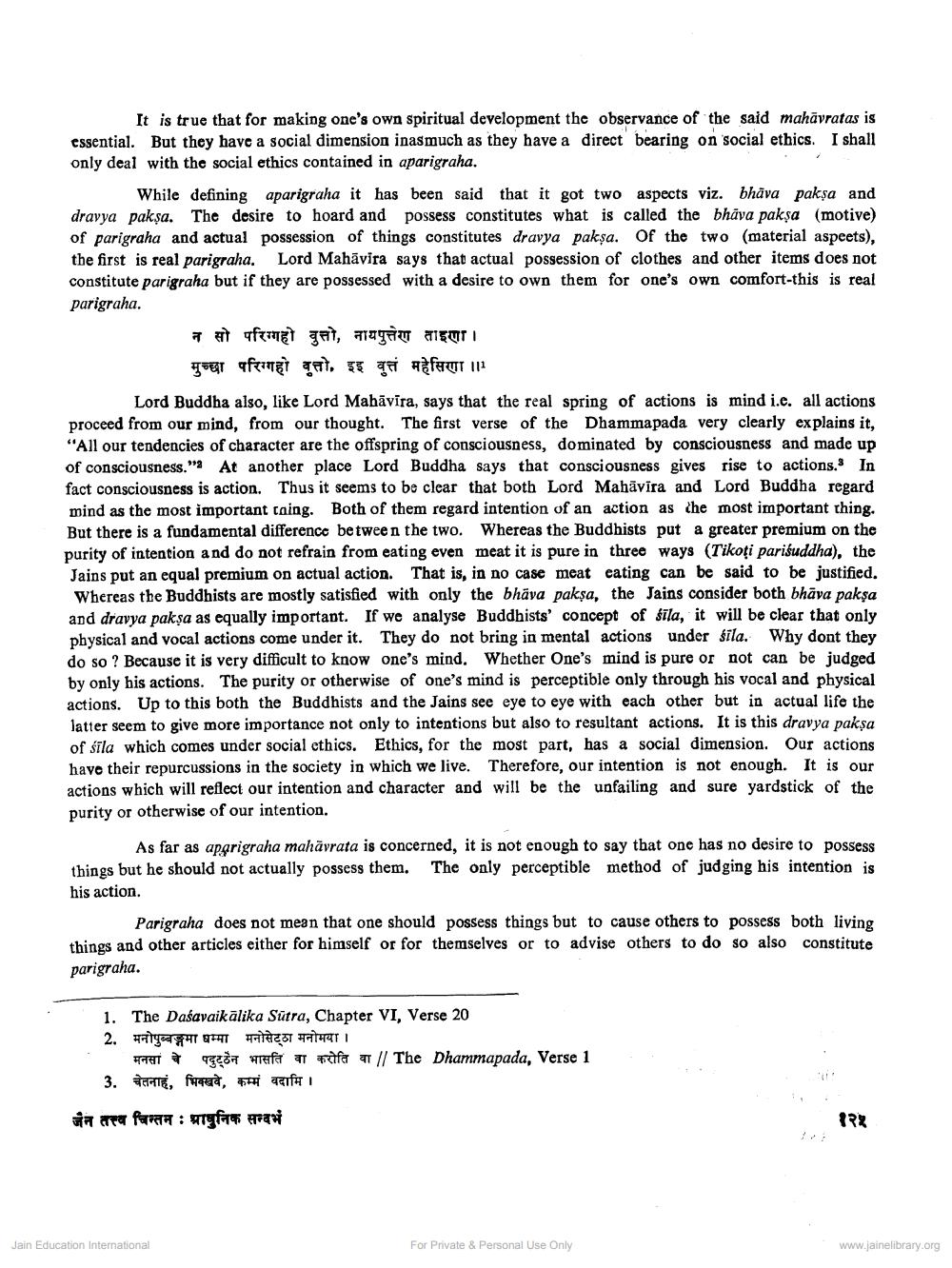________________
It is true that for making one's own spiritual development the observance of the said mahāvratas is essential. But they have a social dimension inasmuch as they have a direct bearing on social ethics. I shall only deal with the social ethics contained in aparigraha.
While defining aparigraha it has been said that it got two aspects viz. bhāva paksa and dravya pakşa. The desire to hoard and possess constitutes what is called the bhāva pakşa (motive) of parigraha and actual possession of things constitutes dravya pakşa. Of the two (material aspeets), the first is real parigraha. Lord Mahāvira says that actual possession of clothes and other items does not constitute parigraha but if they are possessed with a desire to own them for one's own comfort-this is real parigraha.
na af met gat, TageTT NIETTI मुच्छा परिग्गहो वृत्तो, इइ वुत्तं महेसिणा ।।।
Lord Buddha also, like Lord Mahāvīra, says that the real spring of actions is mind i.e. all actions proceed from our mind, from our thought. The first verse of the Dhammapada very clearly explains it, "All our tendencies of character are the offspring of consciousness, dominated by consciousness and made up of consciousness." At another place Lord Buddha says that consciousness gives rise to actions. In fact consciousness is action. Thus it seems to be clear that both Lord Mahavira and Lord Buddha regard mind as the most important coing. Both of them regard intention of an action as the most important thing. But there is a fundamental difference between the two. Whereas the Buddhists put a greater premium on the purity of intention and do not refrain from eating even meat it is pure in three ways (Tikoti parisuddha), the Jains put an equal premium on actual action. That is, in no case meat eating can be said to be justified. Whereas the Buddhists are mostly satisfied with only the bhāva paksa, the Jains consider both bhāva paksa and dravya paksa as equally important. If we analyse Buddhists' concept of sila, it will be clear that only physical and vocal actions come under it. They do not bring in mental actions under sila. Why dont they do so ? Because it is very difficult to know one's mind. Whether One's mind is pure or not can be judged by only his actions. The purity or otherwise of one's mind is perceptible only through his vocal and physical actions. Up to this both the Buddhists and the Jains see eye to eye with each other but in actual life the latter seem to give more importance not only to intentions but also to resultant actions. It is this dravya pakșa of sila which comes under social ethics. Ethics, for the most part, has a social dimension. Our actions have their repurcussions in the society in which we live. Therefore, our intention is not enough. It is our actions which will reflect our intention and character and will be the unfailing and sure yardstick of the purity or otherwise of our intention.
As far as aparigraha mahāvrata is concerned, it is not enough to say that one has no desire to possess things but he should not actually possess them. The only perceptible method of judging his intention is his action.
Parigraha does not mean that one should possess things but to cause others to possess both living things and other articles either for himself or for themselves or to advise others to do so also constitute parigraha.
1. The Daśavaikālika Sūtra, Chapter VI, Verse 20 2. ayah 9 HÈTET HTETI
ET FEŠT refer a Frife at // The Dhammapada, Verse 1 3. HATE, fHead, haifi
जैन तत्व चिन्तन : प्राधुनिक सन्दर्भ
१२५
Jain Education International
For Private & Personal Use Only
www.jainelibrary.org




